Detailed Project Management Report: ABC PLC Acquisition Plan
VerifiedAdded on 2020/07/23
|20
|4325
|89
Report
AI Summary
This report delves into the core principles of project management, presenting a comprehensive analysis structured into two primary tasks. Task 1 addresses fundamental concepts, including project characteristics, scope statements, work breakdown structures, Gantt charts, critical paths, budgeting approaches, risk management strategies, and quality control methods. Task 2 focuses on the development of a project management plan for ABC PLC, specifically concerning an acquisition project. The report outlines the skills and competencies essential for a project manager, details the project management process, and explores the project life cycle stages, including conceptualization, development, execution, and termination. The report also includes a project charter, defining the project title, goals, objectives, key stakeholders, and project scope, providing a practical application of project management theory.
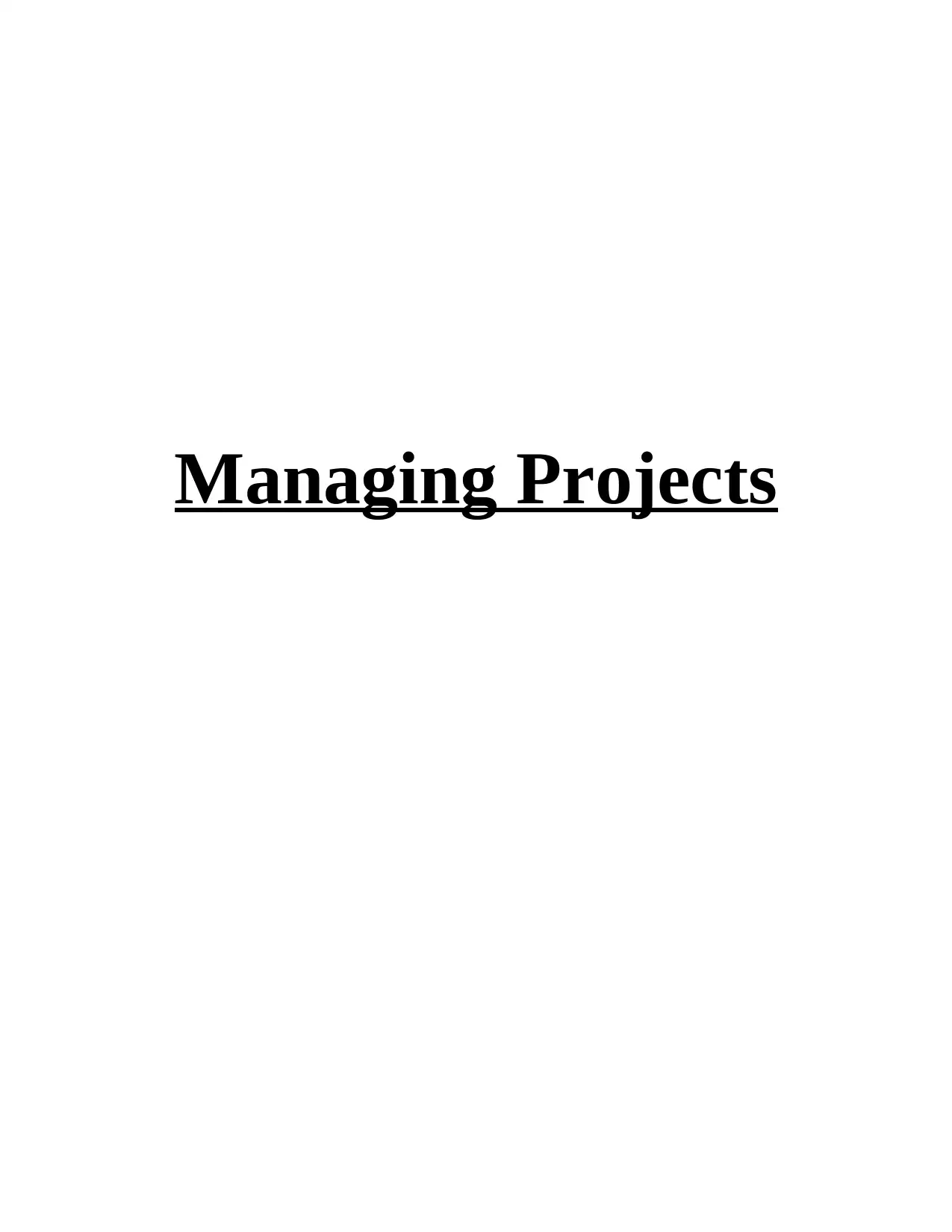
Managing Projects
Paraphrase This Document
Need a fresh take? Get an instant paraphrase of this document with our AI Paraphraser
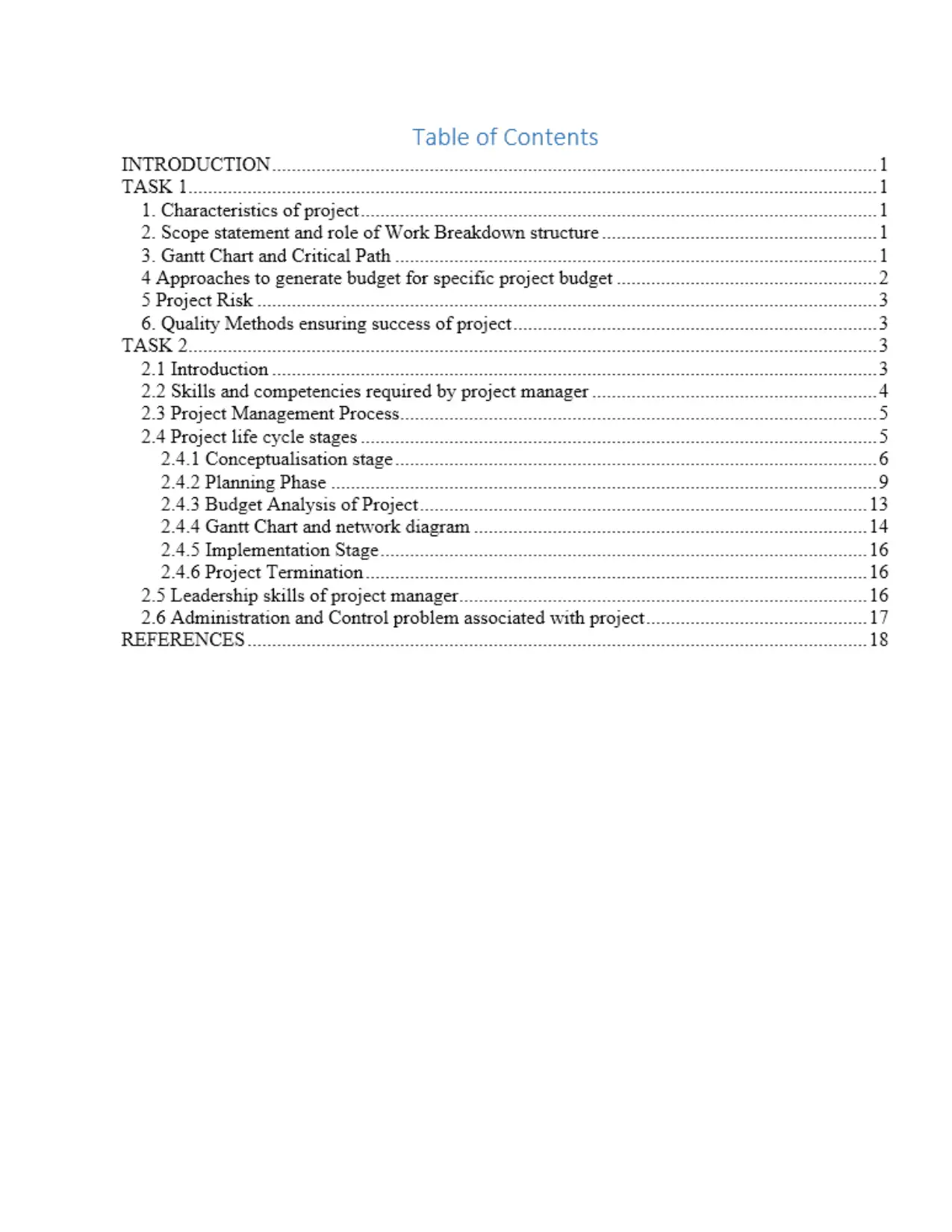
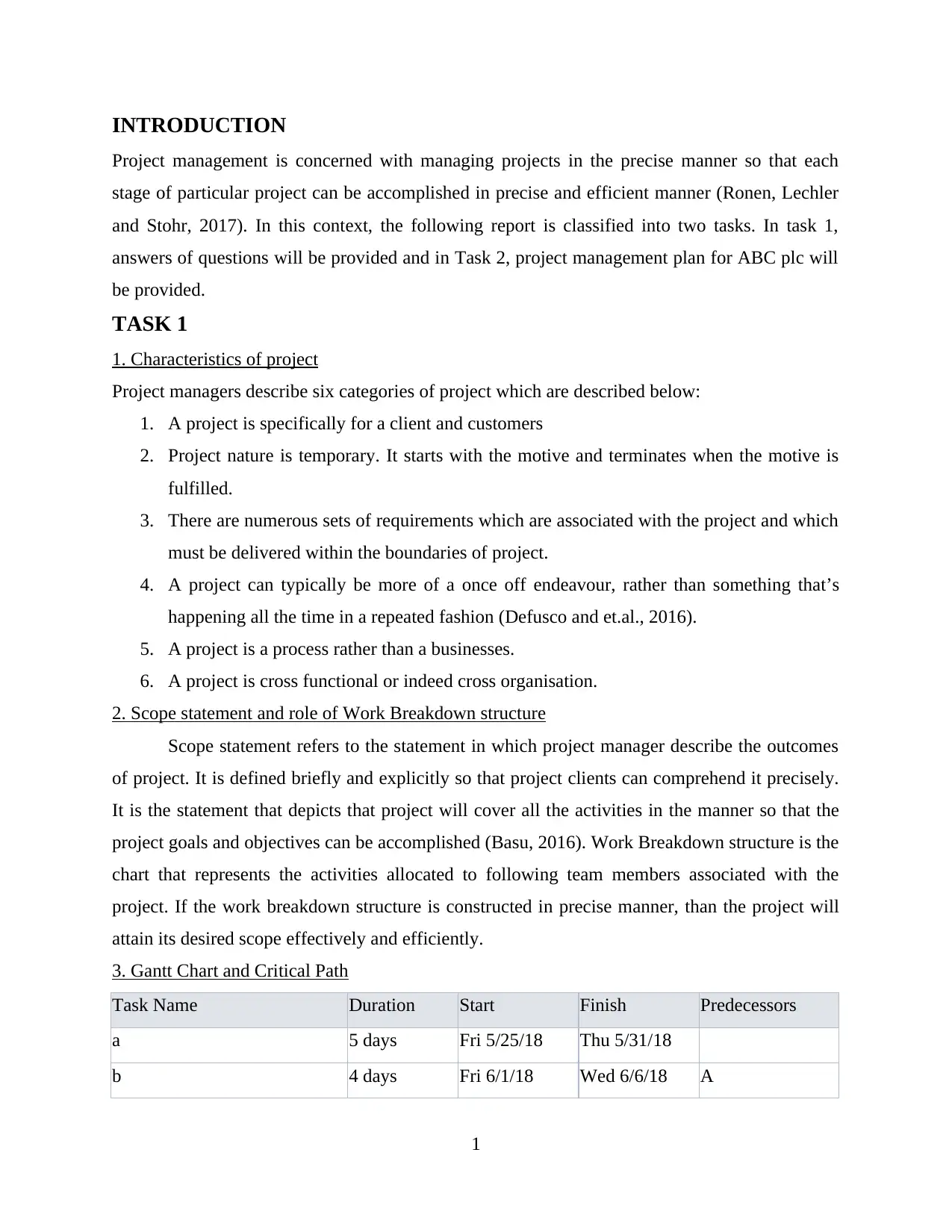
INTRODUCTION
Project management is concerned with managing projects in the precise manner so that each
stage of particular project can be accomplished in precise and efficient manner (Ronen, Lechler
and Stohr, 2017). In this context, the following report is classified into two tasks. In task 1,
answers of questions will be provided and in Task 2, project management plan for ABC plc will
be provided.
TASK 1
1. Characteristics of project
Project managers describe six categories of project which are described below:
1. A project is specifically for a client and customers
2. Project nature is temporary. It starts with the motive and terminates when the motive is
fulfilled.
3. There are numerous sets of requirements which are associated with the project and which
must be delivered within the boundaries of project.
4. A project can typically be more of a once off endeavour, rather than something that’s
happening all the time in a repeated fashion (Defusco and et.al., 2016).
5. A project is a process rather than a businesses.
6. A project is cross functional or indeed cross organisation.
2. Scope statement and role of Work Breakdown structure
Scope statement refers to the statement in which project manager describe the outcomes
of project. It is defined briefly and explicitly so that project clients can comprehend it precisely.
It is the statement that depicts that project will cover all the activities in the manner so that the
project goals and objectives can be accomplished (Basu, 2016). Work Breakdown structure is the
chart that represents the activities allocated to following team members associated with the
project. If the work breakdown structure is constructed in precise manner, than the project will
attain its desired scope effectively and efficiently.
3. Gantt Chart and Critical Path
Task Name Duration Start Finish Predecessors
a 5 days Fri 5/25/18 Thu 5/31/18
b 4 days Fri 6/1/18 Wed 6/6/18 A
1
Project management is concerned with managing projects in the precise manner so that each
stage of particular project can be accomplished in precise and efficient manner (Ronen, Lechler
and Stohr, 2017). In this context, the following report is classified into two tasks. In task 1,
answers of questions will be provided and in Task 2, project management plan for ABC plc will
be provided.
TASK 1
1. Characteristics of project
Project managers describe six categories of project which are described below:
1. A project is specifically for a client and customers
2. Project nature is temporary. It starts with the motive and terminates when the motive is
fulfilled.
3. There are numerous sets of requirements which are associated with the project and which
must be delivered within the boundaries of project.
4. A project can typically be more of a once off endeavour, rather than something that’s
happening all the time in a repeated fashion (Defusco and et.al., 2016).
5. A project is a process rather than a businesses.
6. A project is cross functional or indeed cross organisation.
2. Scope statement and role of Work Breakdown structure
Scope statement refers to the statement in which project manager describe the outcomes
of project. It is defined briefly and explicitly so that project clients can comprehend it precisely.
It is the statement that depicts that project will cover all the activities in the manner so that the
project goals and objectives can be accomplished (Basu, 2016). Work Breakdown structure is the
chart that represents the activities allocated to following team members associated with the
project. If the work breakdown structure is constructed in precise manner, than the project will
attain its desired scope effectively and efficiently.
3. Gantt Chart and Critical Path
Task Name Duration Start Finish Predecessors
a 5 days Fri 5/25/18 Thu 5/31/18
b 4 days Fri 6/1/18 Wed 6/6/18 A
1
⊘ This is a preview!⊘
Do you want full access?
Subscribe today to unlock all pages.

Trusted by 1+ million students worldwide
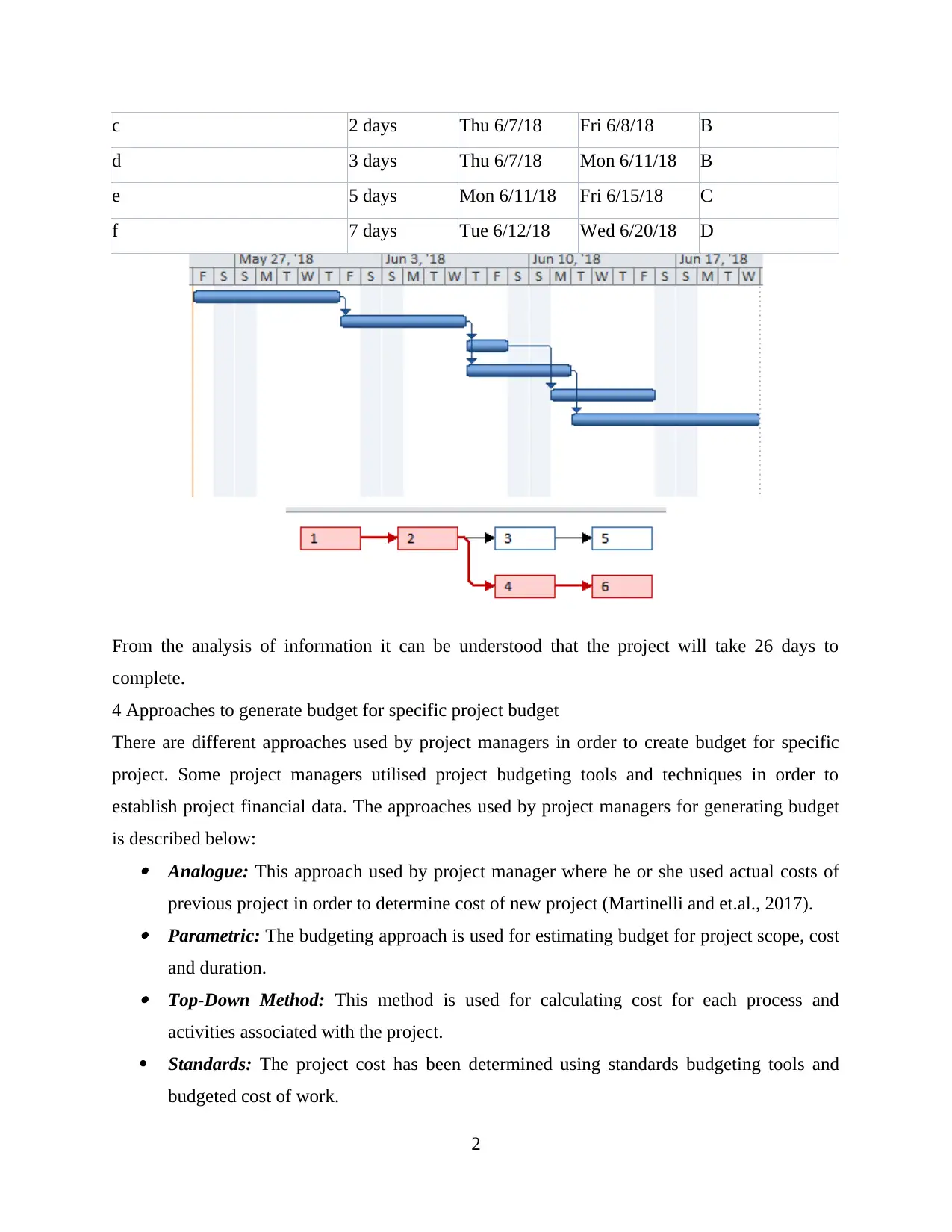
c 2 days Thu 6/7/18 Fri 6/8/18 B
d 3 days Thu 6/7/18 Mon 6/11/18 B
e 5 days Mon 6/11/18 Fri 6/15/18 C
f 7 days Tue 6/12/18 Wed 6/20/18 D
From the analysis of information it can be understood that the project will take 26 days to
complete.
4 Approaches to generate budget for specific project budget
There are different approaches used by project managers in order to create budget for specific
project. Some project managers utilised project budgeting tools and techniques in order to
establish project financial data. The approaches used by project managers for generating budget
is described below: Analogue: This approach used by project manager where he or she used actual costs of
previous project in order to determine cost of new project (Martinelli and et.al., 2017). Parametric: The budgeting approach is used for estimating budget for project scope, cost
and duration. Top-Down Method: This method is used for calculating cost for each process and
activities associated with the project.
Standards: The project cost has been determined using standards budgeting tools and
budgeted cost of work.
2
d 3 days Thu 6/7/18 Mon 6/11/18 B
e 5 days Mon 6/11/18 Fri 6/15/18 C
f 7 days Tue 6/12/18 Wed 6/20/18 D
From the analysis of information it can be understood that the project will take 26 days to
complete.
4 Approaches to generate budget for specific project budget
There are different approaches used by project managers in order to create budget for specific
project. Some project managers utilised project budgeting tools and techniques in order to
establish project financial data. The approaches used by project managers for generating budget
is described below: Analogue: This approach used by project manager where he or she used actual costs of
previous project in order to determine cost of new project (Martinelli and et.al., 2017). Parametric: The budgeting approach is used for estimating budget for project scope, cost
and duration. Top-Down Method: This method is used for calculating cost for each process and
activities associated with the project.
Standards: The project cost has been determined using standards budgeting tools and
budgeted cost of work.
2
Paraphrase This Document
Need a fresh take? Get an instant paraphrase of this document with our AI Paraphraser
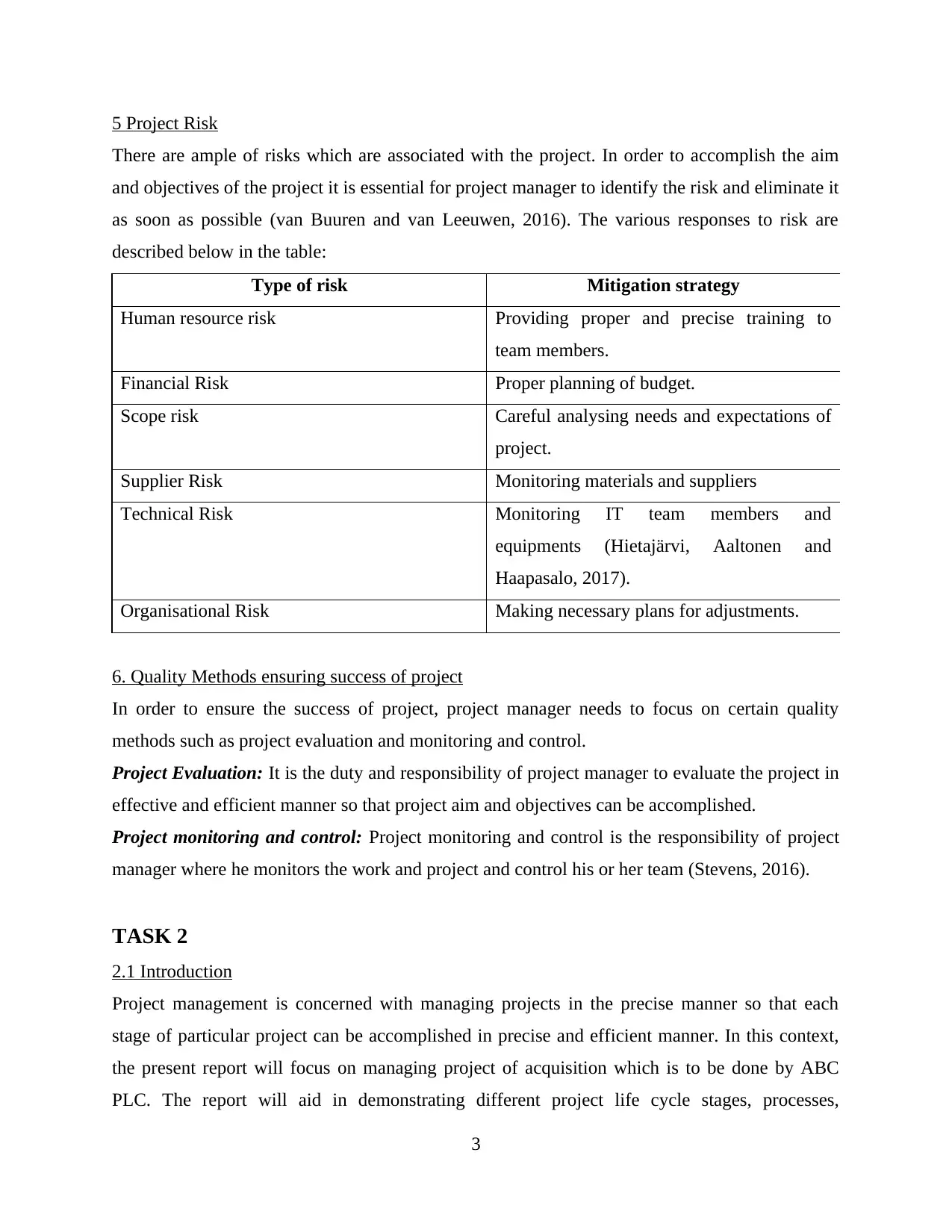
5 Project Risk
There are ample of risks which are associated with the project. In order to accomplish the aim
and objectives of the project it is essential for project manager to identify the risk and eliminate it
as soon as possible (van Buuren and van Leeuwen, 2016). The various responses to risk are
described below in the table:
Type of risk Mitigation strategy
Human resource risk Providing proper and precise training to
team members.
Financial Risk Proper planning of budget.
Scope risk Careful analysing needs and expectations of
project.
Supplier Risk Monitoring materials and suppliers
Technical Risk Monitoring IT team members and
equipments (Hietajärvi, Aaltonen and
Haapasalo, 2017).
Organisational Risk Making necessary plans for adjustments.
6. Quality Methods ensuring success of project
In order to ensure the success of project, project manager needs to focus on certain quality
methods such as project evaluation and monitoring and control.
Project Evaluation: It is the duty and responsibility of project manager to evaluate the project in
effective and efficient manner so that project aim and objectives can be accomplished.
Project monitoring and control: Project monitoring and control is the responsibility of project
manager where he monitors the work and project and control his or her team (Stevens, 2016).
TASK 2
2.1 Introduction
Project management is concerned with managing projects in the precise manner so that each
stage of particular project can be accomplished in precise and efficient manner. In this context,
the present report will focus on managing project of acquisition which is to be done by ABC
PLC. The report will aid in demonstrating different project life cycle stages, processes,
3
There are ample of risks which are associated with the project. In order to accomplish the aim
and objectives of the project it is essential for project manager to identify the risk and eliminate it
as soon as possible (van Buuren and van Leeuwen, 2016). The various responses to risk are
described below in the table:
Type of risk Mitigation strategy
Human resource risk Providing proper and precise training to
team members.
Financial Risk Proper planning of budget.
Scope risk Careful analysing needs and expectations of
project.
Supplier Risk Monitoring materials and suppliers
Technical Risk Monitoring IT team members and
equipments (Hietajärvi, Aaltonen and
Haapasalo, 2017).
Organisational Risk Making necessary plans for adjustments.
6. Quality Methods ensuring success of project
In order to ensure the success of project, project manager needs to focus on certain quality
methods such as project evaluation and monitoring and control.
Project Evaluation: It is the duty and responsibility of project manager to evaluate the project in
effective and efficient manner so that project aim and objectives can be accomplished.
Project monitoring and control: Project monitoring and control is the responsibility of project
manager where he monitors the work and project and control his or her team (Stevens, 2016).
TASK 2
2.1 Introduction
Project management is concerned with managing projects in the precise manner so that each
stage of particular project can be accomplished in precise and efficient manner. In this context,
the present report will focus on managing project of acquisition which is to be done by ABC
PLC. The report will aid in demonstrating different project life cycle stages, processes,
3
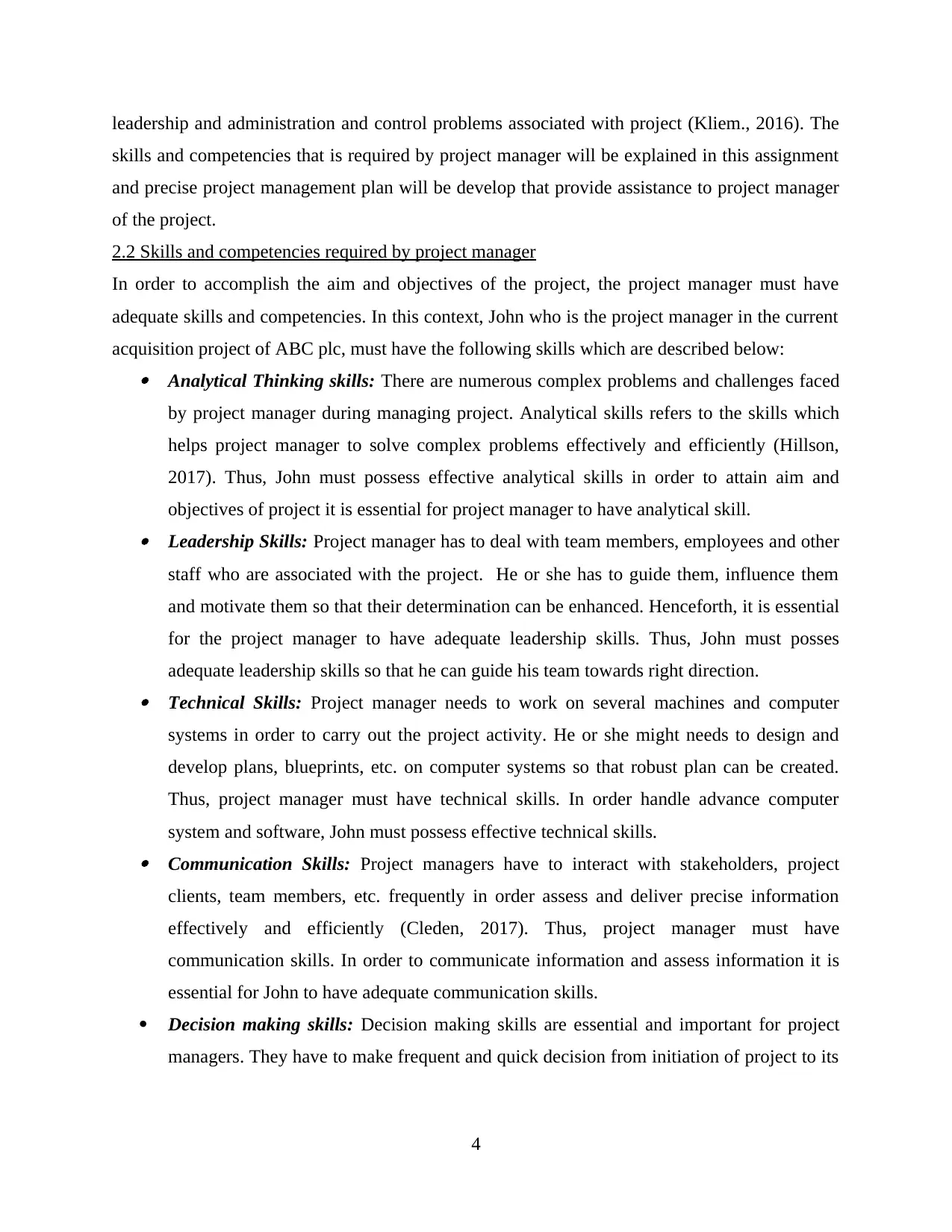
leadership and administration and control problems associated with project (Kliem., 2016). The
skills and competencies that is required by project manager will be explained in this assignment
and precise project management plan will be develop that provide assistance to project manager
of the project.
2.2 Skills and competencies required by project manager
In order to accomplish the aim and objectives of the project, the project manager must have
adequate skills and competencies. In this context, John who is the project manager in the current
acquisition project of ABC plc, must have the following skills which are described below: Analytical Thinking skills: There are numerous complex problems and challenges faced
by project manager during managing project. Analytical skills refers to the skills which
helps project manager to solve complex problems effectively and efficiently (Hillson,
2017). Thus, John must possess effective analytical skills in order to attain aim and
objectives of project it is essential for project manager to have analytical skill. Leadership Skills: Project manager has to deal with team members, employees and other
staff who are associated with the project. He or she has to guide them, influence them
and motivate them so that their determination can be enhanced. Henceforth, it is essential
for the project manager to have adequate leadership skills. Thus, John must posses
adequate leadership skills so that he can guide his team towards right direction. Technical Skills: Project manager needs to work on several machines and computer
systems in order to carry out the project activity. He or she might needs to design and
develop plans, blueprints, etc. on computer systems so that robust plan can be created.
Thus, project manager must have technical skills. In order handle advance computer
system and software, John must possess effective technical skills. Communication Skills: Project managers have to interact with stakeholders, project
clients, team members, etc. frequently in order assess and deliver precise information
effectively and efficiently (Cleden, 2017). Thus, project manager must have
communication skills. In order to communicate information and assess information it is
essential for John to have adequate communication skills.
Decision making skills: Decision making skills are essential and important for project
managers. They have to make frequent and quick decision from initiation of project to its
4
skills and competencies that is required by project manager will be explained in this assignment
and precise project management plan will be develop that provide assistance to project manager
of the project.
2.2 Skills and competencies required by project manager
In order to accomplish the aim and objectives of the project, the project manager must have
adequate skills and competencies. In this context, John who is the project manager in the current
acquisition project of ABC plc, must have the following skills which are described below: Analytical Thinking skills: There are numerous complex problems and challenges faced
by project manager during managing project. Analytical skills refers to the skills which
helps project manager to solve complex problems effectively and efficiently (Hillson,
2017). Thus, John must possess effective analytical skills in order to attain aim and
objectives of project it is essential for project manager to have analytical skill. Leadership Skills: Project manager has to deal with team members, employees and other
staff who are associated with the project. He or she has to guide them, influence them
and motivate them so that their determination can be enhanced. Henceforth, it is essential
for the project manager to have adequate leadership skills. Thus, John must posses
adequate leadership skills so that he can guide his team towards right direction. Technical Skills: Project manager needs to work on several machines and computer
systems in order to carry out the project activity. He or she might needs to design and
develop plans, blueprints, etc. on computer systems so that robust plan can be created.
Thus, project manager must have technical skills. In order handle advance computer
system and software, John must possess effective technical skills. Communication Skills: Project managers have to interact with stakeholders, project
clients, team members, etc. frequently in order assess and deliver precise information
effectively and efficiently (Cleden, 2017). Thus, project manager must have
communication skills. In order to communicate information and assess information it is
essential for John to have adequate communication skills.
Decision making skills: Decision making skills are essential and important for project
managers. They have to make frequent and quick decision from initiation of project to its
4
⊘ This is a preview!⊘
Do you want full access?
Subscribe today to unlock all pages.

Trusted by 1+ million students worldwide
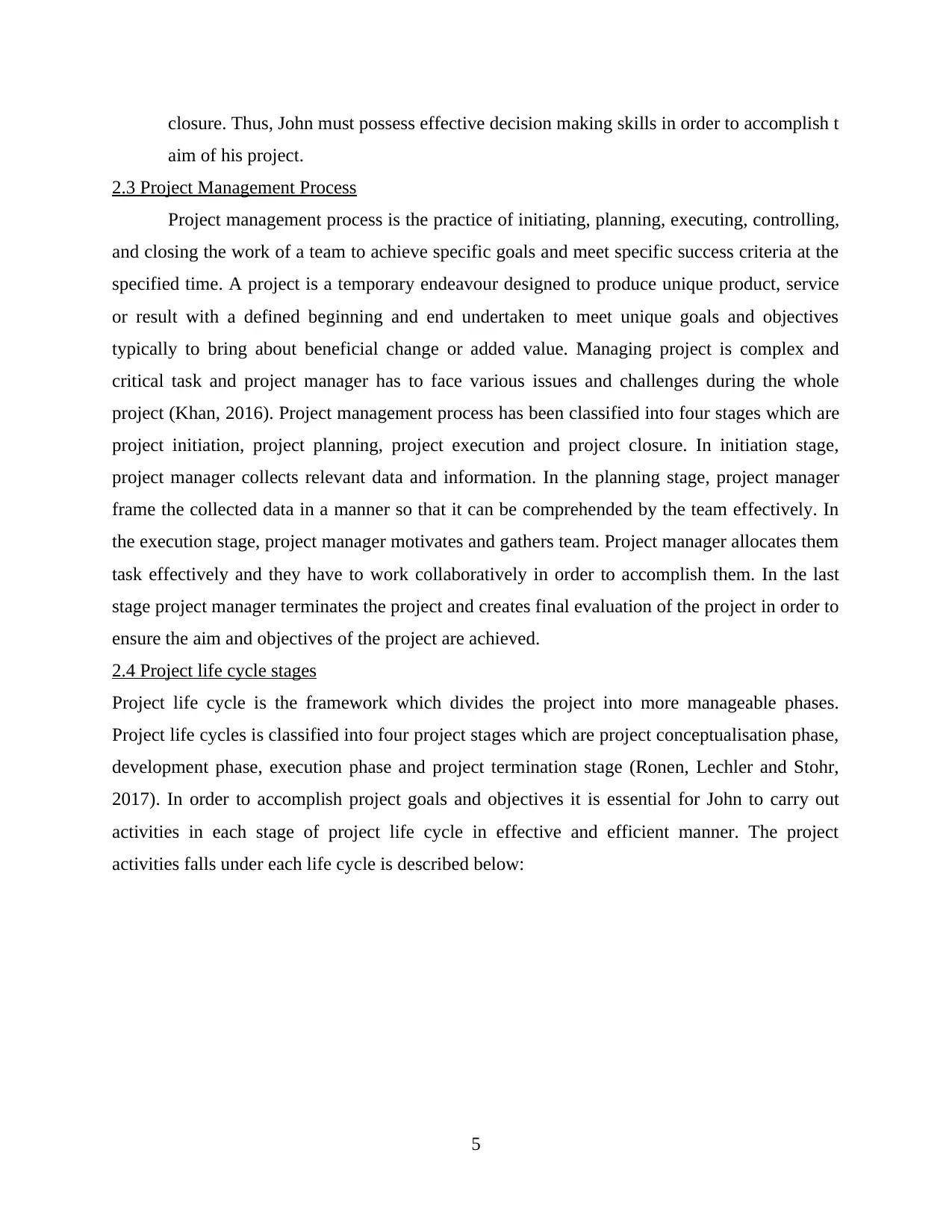
closure. Thus, John must possess effective decision making skills in order to accomplish t
aim of his project.
2.3 Project Management Process
Project management process is the practice of initiating, planning, executing, controlling,
and closing the work of a team to achieve specific goals and meet specific success criteria at the
specified time. A project is a temporary endeavour designed to produce unique product, service
or result with a defined beginning and end undertaken to meet unique goals and objectives
typically to bring about beneficial change or added value. Managing project is complex and
critical task and project manager has to face various issues and challenges during the whole
project (Khan, 2016). Project management process has been classified into four stages which are
project initiation, project planning, project execution and project closure. In initiation stage,
project manager collects relevant data and information. In the planning stage, project manager
frame the collected data in a manner so that it can be comprehended by the team effectively. In
the execution stage, project manager motivates and gathers team. Project manager allocates them
task effectively and they have to work collaboratively in order to accomplish them. In the last
stage project manager terminates the project and creates final evaluation of the project in order to
ensure the aim and objectives of the project are achieved.
2.4 Project life cycle stages
Project life cycle is the framework which divides the project into more manageable phases.
Project life cycles is classified into four project stages which are project conceptualisation phase,
development phase, execution phase and project termination stage (Ronen, Lechler and Stohr,
2017). In order to accomplish project goals and objectives it is essential for John to carry out
activities in each stage of project life cycle in effective and efficient manner. The project
activities falls under each life cycle is described below:
5
aim of his project.
2.3 Project Management Process
Project management process is the practice of initiating, planning, executing, controlling,
and closing the work of a team to achieve specific goals and meet specific success criteria at the
specified time. A project is a temporary endeavour designed to produce unique product, service
or result with a defined beginning and end undertaken to meet unique goals and objectives
typically to bring about beneficial change or added value. Managing project is complex and
critical task and project manager has to face various issues and challenges during the whole
project (Khan, 2016). Project management process has been classified into four stages which are
project initiation, project planning, project execution and project closure. In initiation stage,
project manager collects relevant data and information. In the planning stage, project manager
frame the collected data in a manner so that it can be comprehended by the team effectively. In
the execution stage, project manager motivates and gathers team. Project manager allocates them
task effectively and they have to work collaboratively in order to accomplish them. In the last
stage project manager terminates the project and creates final evaluation of the project in order to
ensure the aim and objectives of the project are achieved.
2.4 Project life cycle stages
Project life cycle is the framework which divides the project into more manageable phases.
Project life cycles is classified into four project stages which are project conceptualisation phase,
development phase, execution phase and project termination stage (Ronen, Lechler and Stohr,
2017). In order to accomplish project goals and objectives it is essential for John to carry out
activities in each stage of project life cycle in effective and efficient manner. The project
activities falls under each life cycle is described below:
5
Paraphrase This Document
Need a fresh take? Get an instant paraphrase of this document with our AI Paraphraser
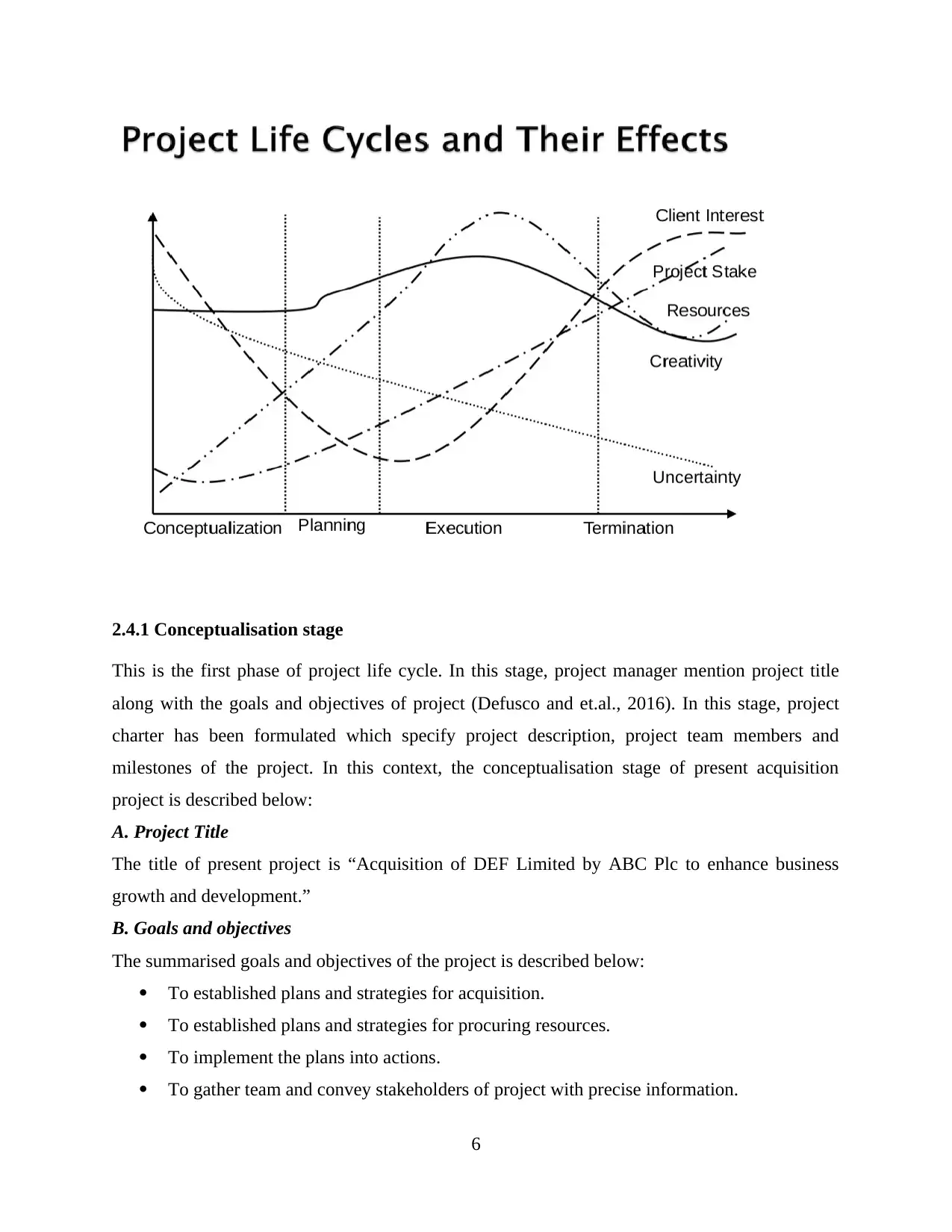
2.4.1 Conceptualisation stage
This is the first phase of project life cycle. In this stage, project manager mention project title
along with the goals and objectives of project (Defusco and et.al., 2016). In this stage, project
charter has been formulated which specify project description, project team members and
milestones of the project. In this context, the conceptualisation stage of present acquisition
project is described below:
A. Project Title
The title of present project is “Acquisition of DEF Limited by ABC Plc to enhance business
growth and development.”
B. Goals and objectives
The summarised goals and objectives of the project is described below:
To established plans and strategies for acquisition.
To established plans and strategies for procuring resources.
To implement the plans into actions.
To gather team and convey stakeholders of project with precise information.
6
This is the first phase of project life cycle. In this stage, project manager mention project title
along with the goals and objectives of project (Defusco and et.al., 2016). In this stage, project
charter has been formulated which specify project description, project team members and
milestones of the project. In this context, the conceptualisation stage of present acquisition
project is described below:
A. Project Title
The title of present project is “Acquisition of DEF Limited by ABC Plc to enhance business
growth and development.”
B. Goals and objectives
The summarised goals and objectives of the project is described below:
To established plans and strategies for acquisition.
To established plans and strategies for procuring resources.
To implement the plans into actions.
To gather team and convey stakeholders of project with precise information.
6
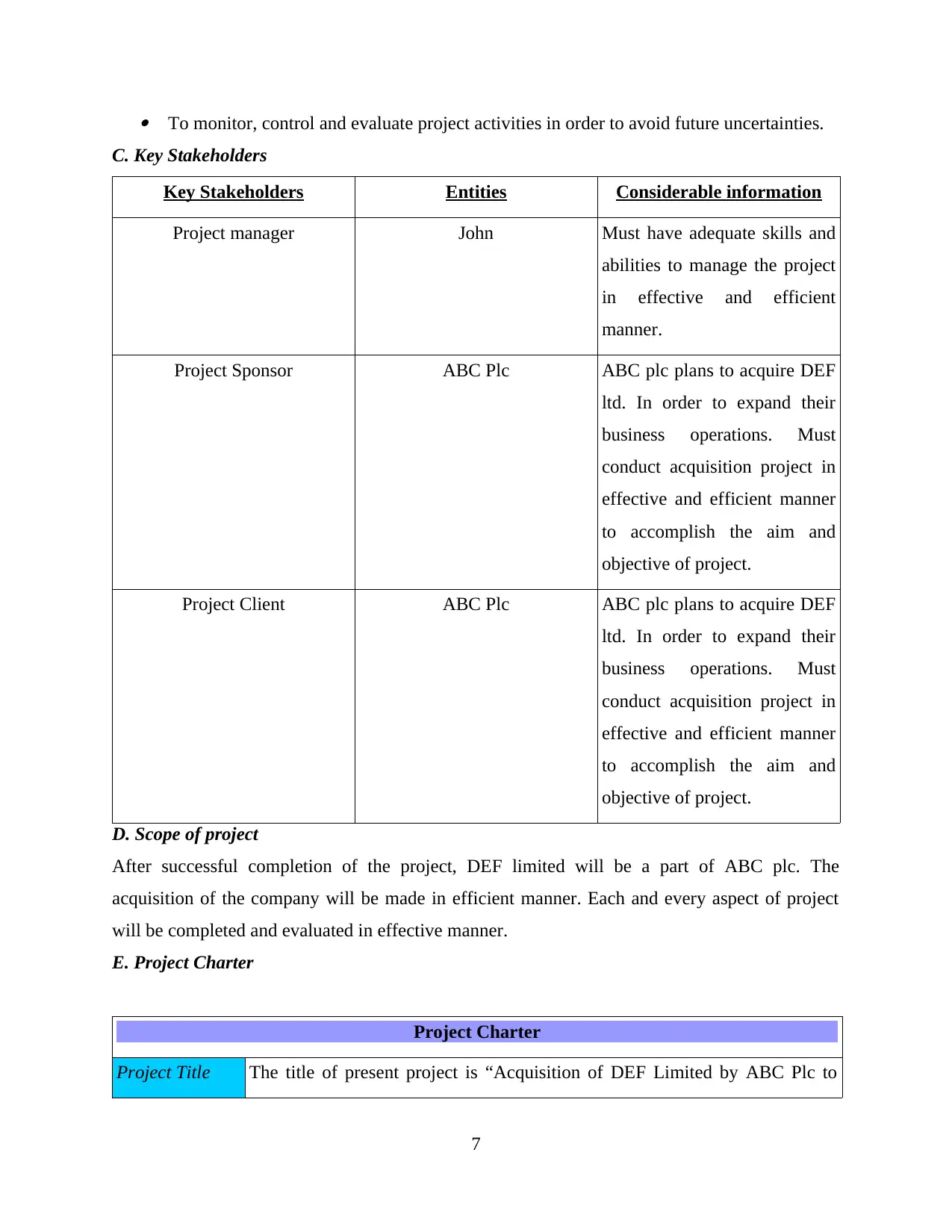
To monitor, control and evaluate project activities in order to avoid future uncertainties.
C. Key Stakeholders
Key Stakeholders Entities Considerable information
Project manager John Must have adequate skills and
abilities to manage the project
in effective and efficient
manner.
Project Sponsor ABC Plc ABC plc plans to acquire DEF
ltd. In order to expand their
business operations. Must
conduct acquisition project in
effective and efficient manner
to accomplish the aim and
objective of project.
Project Client ABC Plc ABC plc plans to acquire DEF
ltd. In order to expand their
business operations. Must
conduct acquisition project in
effective and efficient manner
to accomplish the aim and
objective of project.
D. Scope of project
After successful completion of the project, DEF limited will be a part of ABC plc. The
acquisition of the company will be made in efficient manner. Each and every aspect of project
will be completed and evaluated in effective manner.
E. Project Charter
Project Charter
Project Title The title of present project is “Acquisition of DEF Limited by ABC Plc to
7
C. Key Stakeholders
Key Stakeholders Entities Considerable information
Project manager John Must have adequate skills and
abilities to manage the project
in effective and efficient
manner.
Project Sponsor ABC Plc ABC plc plans to acquire DEF
ltd. In order to expand their
business operations. Must
conduct acquisition project in
effective and efficient manner
to accomplish the aim and
objective of project.
Project Client ABC Plc ABC plc plans to acquire DEF
ltd. In order to expand their
business operations. Must
conduct acquisition project in
effective and efficient manner
to accomplish the aim and
objective of project.
D. Scope of project
After successful completion of the project, DEF limited will be a part of ABC plc. The
acquisition of the company will be made in efficient manner. Each and every aspect of project
will be completed and evaluated in effective manner.
E. Project Charter
Project Charter
Project Title The title of present project is “Acquisition of DEF Limited by ABC Plc to
7
⊘ This is a preview!⊘
Do you want full access?
Subscribe today to unlock all pages.

Trusted by 1+ million students worldwide
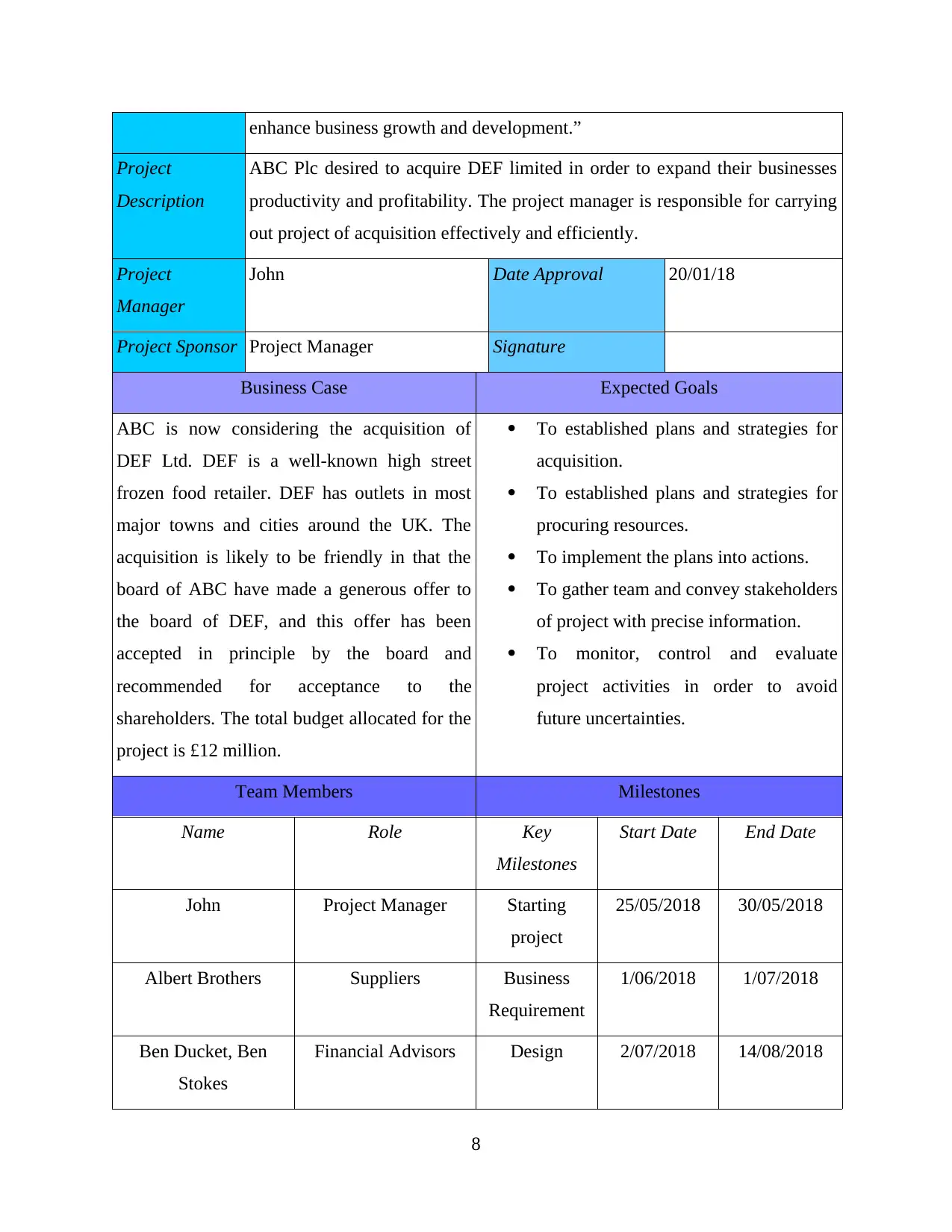
enhance business growth and development.”
Project
Description
ABC Plc desired to acquire DEF limited in order to expand their businesses
productivity and profitability. The project manager is responsible for carrying
out project of acquisition effectively and efficiently.
Project
Manager
John Date Approval 20/01/18
Project Sponsor Project Manager Signature
Business Case Expected Goals
ABC is now considering the acquisition of
DEF Ltd. DEF is a well-known high street
frozen food retailer. DEF has outlets in most
major towns and cities around the UK. The
acquisition is likely to be friendly in that the
board of ABC have made a generous offer to
the board of DEF, and this offer has been
accepted in principle by the board and
recommended for acceptance to the
shareholders. The total budget allocated for the
project is £12 million.
To established plans and strategies for
acquisition.
To established plans and strategies for
procuring resources.
To implement the plans into actions.
To gather team and convey stakeholders
of project with precise information.
To monitor, control and evaluate
project activities in order to avoid
future uncertainties.
Team Members Milestones
Name Role Key
Milestones
Start Date End Date
John Project Manager Starting
project
25/05/2018 30/05/2018
Albert Brothers Suppliers Business
Requirement
1/06/2018 1/07/2018
Ben Ducket, Ben
Stokes
Financial Advisors Design 2/07/2018 14/08/2018
8
Project
Description
ABC Plc desired to acquire DEF limited in order to expand their businesses
productivity and profitability. The project manager is responsible for carrying
out project of acquisition effectively and efficiently.
Project
Manager
John Date Approval 20/01/18
Project Sponsor Project Manager Signature
Business Case Expected Goals
ABC is now considering the acquisition of
DEF Ltd. DEF is a well-known high street
frozen food retailer. DEF has outlets in most
major towns and cities around the UK. The
acquisition is likely to be friendly in that the
board of ABC have made a generous offer to
the board of DEF, and this offer has been
accepted in principle by the board and
recommended for acceptance to the
shareholders. The total budget allocated for the
project is £12 million.
To established plans and strategies for
acquisition.
To established plans and strategies for
procuring resources.
To implement the plans into actions.
To gather team and convey stakeholders
of project with precise information.
To monitor, control and evaluate
project activities in order to avoid
future uncertainties.
Team Members Milestones
Name Role Key
Milestones
Start Date End Date
John Project Manager Starting
project
25/05/2018 30/05/2018
Albert Brothers Suppliers Business
Requirement
1/06/2018 1/07/2018
Ben Ducket, Ben
Stokes
Financial Advisors Design 2/07/2018 14/08/2018
8
Paraphrase This Document
Need a fresh take? Get an instant paraphrase of this document with our AI Paraphraser
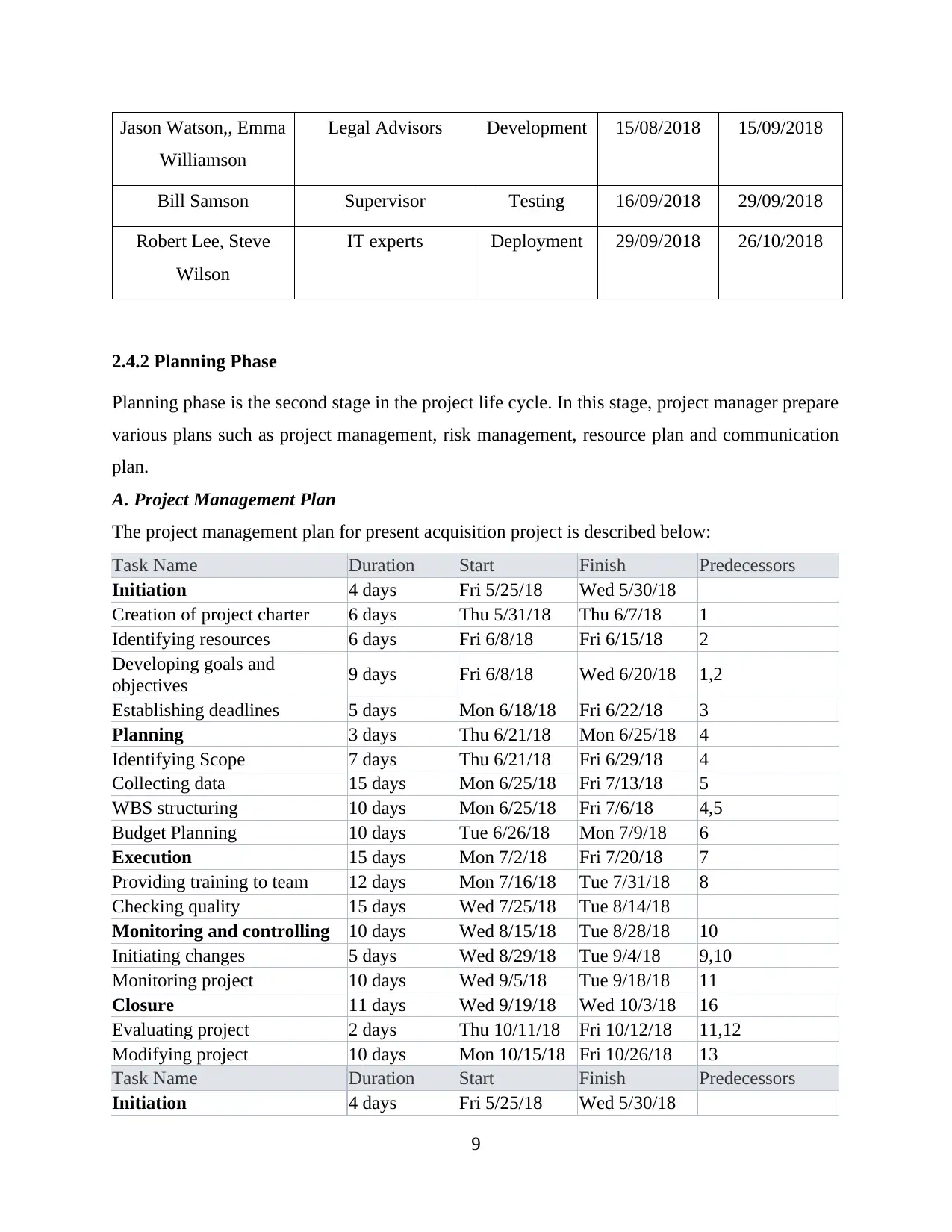
Jason Watson,, Emma
Williamson
Legal Advisors Development 15/08/2018 15/09/2018
Bill Samson Supervisor Testing 16/09/2018 29/09/2018
Robert Lee, Steve
Wilson
IT experts Deployment 29/09/2018 26/10/2018
2.4.2 Planning Phase
Planning phase is the second stage in the project life cycle. In this stage, project manager prepare
various plans such as project management, risk management, resource plan and communication
plan.
A. Project Management Plan
The project management plan for present acquisition project is described below:
Task Name Duration Start Finish Predecessors
Initiation 4 days Fri 5/25/18 Wed 5/30/18
Creation of project charter 6 days Thu 5/31/18 Thu 6/7/18 1
Identifying resources 6 days Fri 6/8/18 Fri 6/15/18 2
Developing goals and
objectives 9 days Fri 6/8/18 Wed 6/20/18 1,2
Establishing deadlines 5 days Mon 6/18/18 Fri 6/22/18 3
Planning 3 days Thu 6/21/18 Mon 6/25/18 4
Identifying Scope 7 days Thu 6/21/18 Fri 6/29/18 4
Collecting data 15 days Mon 6/25/18 Fri 7/13/18 5
WBS structuring 10 days Mon 6/25/18 Fri 7/6/18 4,5
Budget Planning 10 days Tue 6/26/18 Mon 7/9/18 6
Execution 15 days Mon 7/2/18 Fri 7/20/18 7
Providing training to team 12 days Mon 7/16/18 Tue 7/31/18 8
Checking quality 15 days Wed 7/25/18 Tue 8/14/18
Monitoring and controlling 10 days Wed 8/15/18 Tue 8/28/18 10
Initiating changes 5 days Wed 8/29/18 Tue 9/4/18 9,10
Monitoring project 10 days Wed 9/5/18 Tue 9/18/18 11
Closure 11 days Wed 9/19/18 Wed 10/3/18 16
Evaluating project 2 days Thu 10/11/18 Fri 10/12/18 11,12
Modifying project 10 days Mon 10/15/18 Fri 10/26/18 13
Task Name Duration Start Finish Predecessors
Initiation 4 days Fri 5/25/18 Wed 5/30/18
9
Williamson
Legal Advisors Development 15/08/2018 15/09/2018
Bill Samson Supervisor Testing 16/09/2018 29/09/2018
Robert Lee, Steve
Wilson
IT experts Deployment 29/09/2018 26/10/2018
2.4.2 Planning Phase
Planning phase is the second stage in the project life cycle. In this stage, project manager prepare
various plans such as project management, risk management, resource plan and communication
plan.
A. Project Management Plan
The project management plan for present acquisition project is described below:
Task Name Duration Start Finish Predecessors
Initiation 4 days Fri 5/25/18 Wed 5/30/18
Creation of project charter 6 days Thu 5/31/18 Thu 6/7/18 1
Identifying resources 6 days Fri 6/8/18 Fri 6/15/18 2
Developing goals and
objectives 9 days Fri 6/8/18 Wed 6/20/18 1,2
Establishing deadlines 5 days Mon 6/18/18 Fri 6/22/18 3
Planning 3 days Thu 6/21/18 Mon 6/25/18 4
Identifying Scope 7 days Thu 6/21/18 Fri 6/29/18 4
Collecting data 15 days Mon 6/25/18 Fri 7/13/18 5
WBS structuring 10 days Mon 6/25/18 Fri 7/6/18 4,5
Budget Planning 10 days Tue 6/26/18 Mon 7/9/18 6
Execution 15 days Mon 7/2/18 Fri 7/20/18 7
Providing training to team 12 days Mon 7/16/18 Tue 7/31/18 8
Checking quality 15 days Wed 7/25/18 Tue 8/14/18
Monitoring and controlling 10 days Wed 8/15/18 Tue 8/28/18 10
Initiating changes 5 days Wed 8/29/18 Tue 9/4/18 9,10
Monitoring project 10 days Wed 9/5/18 Tue 9/18/18 11
Closure 11 days Wed 9/19/18 Wed 10/3/18 16
Evaluating project 2 days Thu 10/11/18 Fri 10/12/18 11,12
Modifying project 10 days Mon 10/15/18 Fri 10/26/18 13
Task Name Duration Start Finish Predecessors
Initiation 4 days Fri 5/25/18 Wed 5/30/18
9
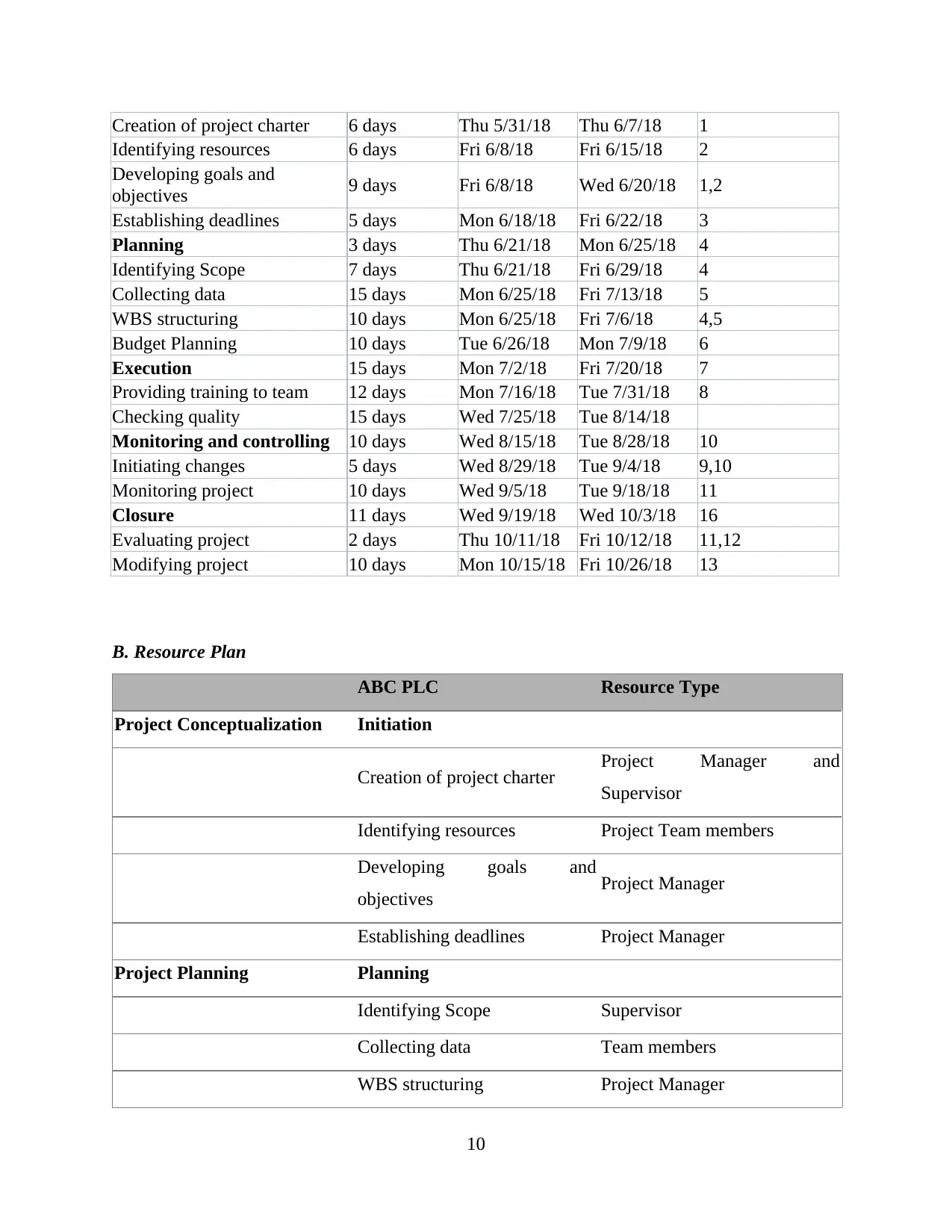
Creation of project charter 6 days Thu 5/31/18 Thu 6/7/18 1
Identifying resources 6 days Fri 6/8/18 Fri 6/15/18 2
Developing goals and
objectives 9 days Fri 6/8/18 Wed 6/20/18 1,2
Establishing deadlines 5 days Mon 6/18/18 Fri 6/22/18 3
Planning 3 days Thu 6/21/18 Mon 6/25/18 4
Identifying Scope 7 days Thu 6/21/18 Fri 6/29/18 4
Collecting data 15 days Mon 6/25/18 Fri 7/13/18 5
WBS structuring 10 days Mon 6/25/18 Fri 7/6/18 4,5
Budget Planning 10 days Tue 6/26/18 Mon 7/9/18 6
Execution 15 days Mon 7/2/18 Fri 7/20/18 7
Providing training to team 12 days Mon 7/16/18 Tue 7/31/18 8
Checking quality 15 days Wed 7/25/18 Tue 8/14/18
Monitoring and controlling 10 days Wed 8/15/18 Tue 8/28/18 10
Initiating changes 5 days Wed 8/29/18 Tue 9/4/18 9,10
Monitoring project 10 days Wed 9/5/18 Tue 9/18/18 11
Closure 11 days Wed 9/19/18 Wed 10/3/18 16
Evaluating project 2 days Thu 10/11/18 Fri 10/12/18 11,12
Modifying project 10 days Mon 10/15/18 Fri 10/26/18 13
B. Resource Plan
ABC PLC Resource Type
Project Conceptualization Initiation
Creation of project charter Project Manager and
Supervisor
Identifying resources Project Team members
Developing goals and
objectives Project Manager
Establishing deadlines Project Manager
Project Planning Planning
Identifying Scope Supervisor
Collecting data Team members
WBS structuring Project Manager
10
Identifying resources 6 days Fri 6/8/18 Fri 6/15/18 2
Developing goals and
objectives 9 days Fri 6/8/18 Wed 6/20/18 1,2
Establishing deadlines 5 days Mon 6/18/18 Fri 6/22/18 3
Planning 3 days Thu 6/21/18 Mon 6/25/18 4
Identifying Scope 7 days Thu 6/21/18 Fri 6/29/18 4
Collecting data 15 days Mon 6/25/18 Fri 7/13/18 5
WBS structuring 10 days Mon 6/25/18 Fri 7/6/18 4,5
Budget Planning 10 days Tue 6/26/18 Mon 7/9/18 6
Execution 15 days Mon 7/2/18 Fri 7/20/18 7
Providing training to team 12 days Mon 7/16/18 Tue 7/31/18 8
Checking quality 15 days Wed 7/25/18 Tue 8/14/18
Monitoring and controlling 10 days Wed 8/15/18 Tue 8/28/18 10
Initiating changes 5 days Wed 8/29/18 Tue 9/4/18 9,10
Monitoring project 10 days Wed 9/5/18 Tue 9/18/18 11
Closure 11 days Wed 9/19/18 Wed 10/3/18 16
Evaluating project 2 days Thu 10/11/18 Fri 10/12/18 11,12
Modifying project 10 days Mon 10/15/18 Fri 10/26/18 13
B. Resource Plan
ABC PLC Resource Type
Project Conceptualization Initiation
Creation of project charter Project Manager and
Supervisor
Identifying resources Project Team members
Developing goals and
objectives Project Manager
Establishing deadlines Project Manager
Project Planning Planning
Identifying Scope Supervisor
Collecting data Team members
WBS structuring Project Manager
10
⊘ This is a preview!⊘
Do you want full access?
Subscribe today to unlock all pages.

Trusted by 1+ million students worldwide
1 out of 20
Related Documents
Your All-in-One AI-Powered Toolkit for Academic Success.
+13062052269
info@desklib.com
Available 24*7 on WhatsApp / Email
![[object Object]](/_next/static/media/star-bottom.7253800d.svg)
Unlock your academic potential
Copyright © 2020–2026 A2Z Services. All Rights Reserved. Developed and managed by ZUCOL.



